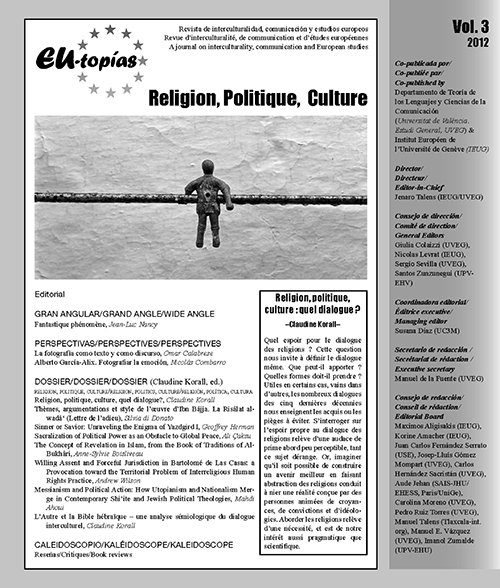Willing Assent and Forceful Jurisdiction in Bartolomé de Las Casas
DOI:
https://doi.org/10.7203/eutopias.1.18495Keywords:
Bartolomé de Las Casas, human rights, Spanish history, Atlantic world, canon law, church history, religious conflict, interreligious dialogue Abstract
Abstract
Bartolomé de Las Casas (1484-1566) is commonly known for his defense of Native Americans rights and rationality. For this, Las Casas is revered as a patron of anti-colonialism and human rights. This paper shows how his Defense of the Indians, rather than being chiefly concerned with distinguishing Indians from racially different barbarians and natural slaves—the standard anthropological interpretation of modern interpreters—is understood as distinguishing Indians from religiously different Moors, Turks, Saracens, and Jews. It explores the jurisprudential context of the crusades in Las Casas’s argument, and highlights the supreme importance of how a Christian’s right to “contentious jurisdiction” over territory is exercised. Final comments urge the distinction of Las Casas’s anthropological and territorial concerns, and encourage interreligious dialogue to better address the problem of territory.
 Downloads
Downloads
Downloads
Published
How to Cite
-
Abstract458
-
PDF83
Issue
Section
License
![]()
The authors conserve the copyright. All content published in EU-topías. Journal of interculturality, Communication, and European Studies are subject to the license Creative Commons Attribution-NonCommercial-ShareAlike 4.0 license. The full text of the license can be found at <http://creativecommons.org/licenses/by-nc-sa/4.0>
They may be copied, used, disseminated, transmitted and publicly displayed, provided that:
- The authorship and original source of the publication is cited (journal, publisher and URL of the work).
- They are not used for commercial purposes.
- The existence and specifications of this license of use are mentioned.
It is the responsibility of the authors to obtain the necessary permissions for images that are subject to copyright.



